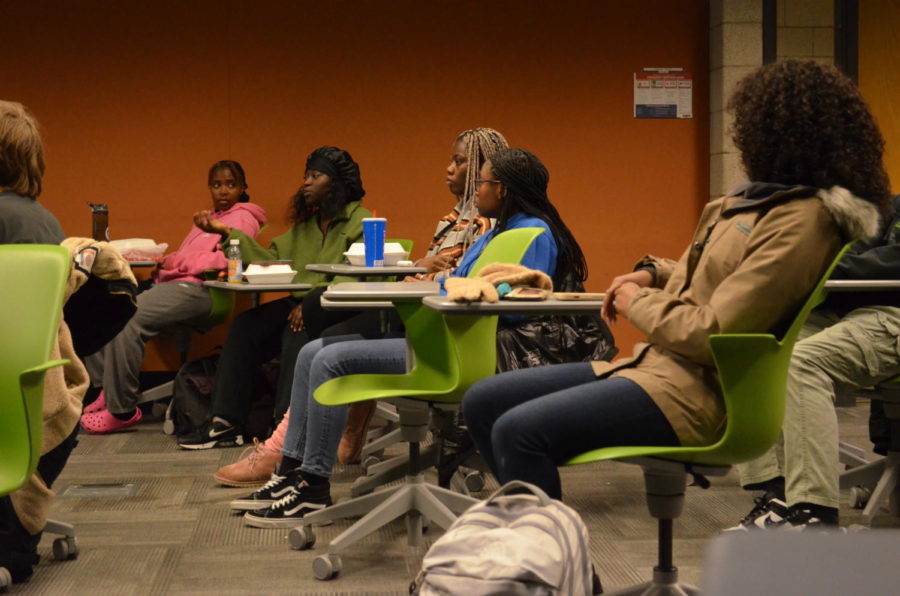‘It’s traumatizing for me’: Students convene to grieve the loss of Tyre Nichols
Members of Black Student Alliance discuss their reactions to the initial news of Tyre Nichols death on Tuesday, Jan. 31.
In the wake of the murder of Tyre Nichols, a 29-year-old Black man, LaKayla George, a sophomore majoring in pre-architecture, said a lack of understanding toward the Black community is not exclusive to law enforcement.
The Black Student Alliance facilitated a general audience meeting to discuss the impact it has had on their mental health and the Black community as a whole.
“You can tell how other people interact with us as Black students on campus; we walk in the classroom, [and] automatically, the white girls are not walking up to me,” said George, treasurer for the Black Student Alliance. “I don’t know; it’s almost like they’re scared in a sense.”
Nichols was stopped by police on Jan. 7 in Memphis, Tennessee, for reckless driving, pulled out of his vehicle, thrown to the ground, tased, pepper sprayed, chased, beaten and ultimately died due to “extensive bleeding caused by a severe beating,” according to a statement issued by the Nichols’ family’s attorney.
Ma’Kaiyla Johnson is a junior majoring in pre-athletic training and president of the organization. She said she was pleased with how quickly five of the officers involved in Nichols’ death were indicted in comparison to previous acts of police brutality but suggested the haste may have been fueled by the fact that none of them were white.
“Are they changing it because they’re trying to do better, or is it just because they so happen to be Black, so it made it just a little bit easier?” Johnson asked.
When it comes to dealing with law enforcement, some Black students expressed that they feel like they have to minimize themselves for the sake of an encounter.
Joetta McClain, a freshman majoring in biology, said growing up, she and her siblings were taught to be bold, vocal and to move with purpose, but she fears her family values may cause an interaction with law enforcement to go downhill.
“God forbid a police officer that might try to shut them up – you see it a lot on social media,” McClain said. “They’re literally degrading.”
Tyrique Ross, a sophomore majoring in pre-community and regional planning, shared an encounter he had with a security officer during the meeting.
“Not to be clueless, but sometimes I forget I’m Black,” Ross said. “I almost got shot by a bank security officer, but the worker had told me to go talk to the bank security officer.”
Ross said had he been thinking about his identity as a Black man, he would have navigated the situation with more caution.
Toyia Younger, senior vice president of student affairs, said the increased coverage of police brutality takes a toll on the Black community.
“For the Black community, I think it can be very traumatizing– it’s traumatizing for me,” Younger said. “It’s mentally and racially taxing. It’s exhausting.”
Younger said she had to take Tuesday off to be able to process the loss of Nichols so that she could have the capacity to be an active leader on campus.
“As a Black woman, I had to step away when I heard that Tyre Nichols called for his mother; he could have been my child,” Younger said. “The reality is, when I see situations like that, I feel like that’s the ultimate form of fear: when you just don’t even know what to do, the last thing you do is cry out to your mom.”
Younger said she has not had any personal violent encounters with law enforcement, but there is an element of fear that has been bred due to the increased coverage of police brutality.
“I’m a single Black woman, and I can be in the car anywhere– not just here in Iowa– I can be driving anywhere, and after seeing so many incidents and situations that we’ve seen so much in the news recently, it does create a level of fear sometimes,” Younger said. “I’m grateful that I haven’t had that experience, but I’m also mindful of my surroundings.”
Younger asked those in attendance to prioritize themselves.
“What we experience every time these violent situations take place in our community is really trauma, and it’s a certain form of trauma,” Younger said. “I’m just encouraging you all to do what you need to to take care of yourselves.”
Your donation will support the student journalists of the Iowa State Daily. Your contribution will allow us to purchase equipment, send our student journalists to conferences and off-set their cost of living so they can continue to do best-in-the-nation work at the Iowa State Daily.















